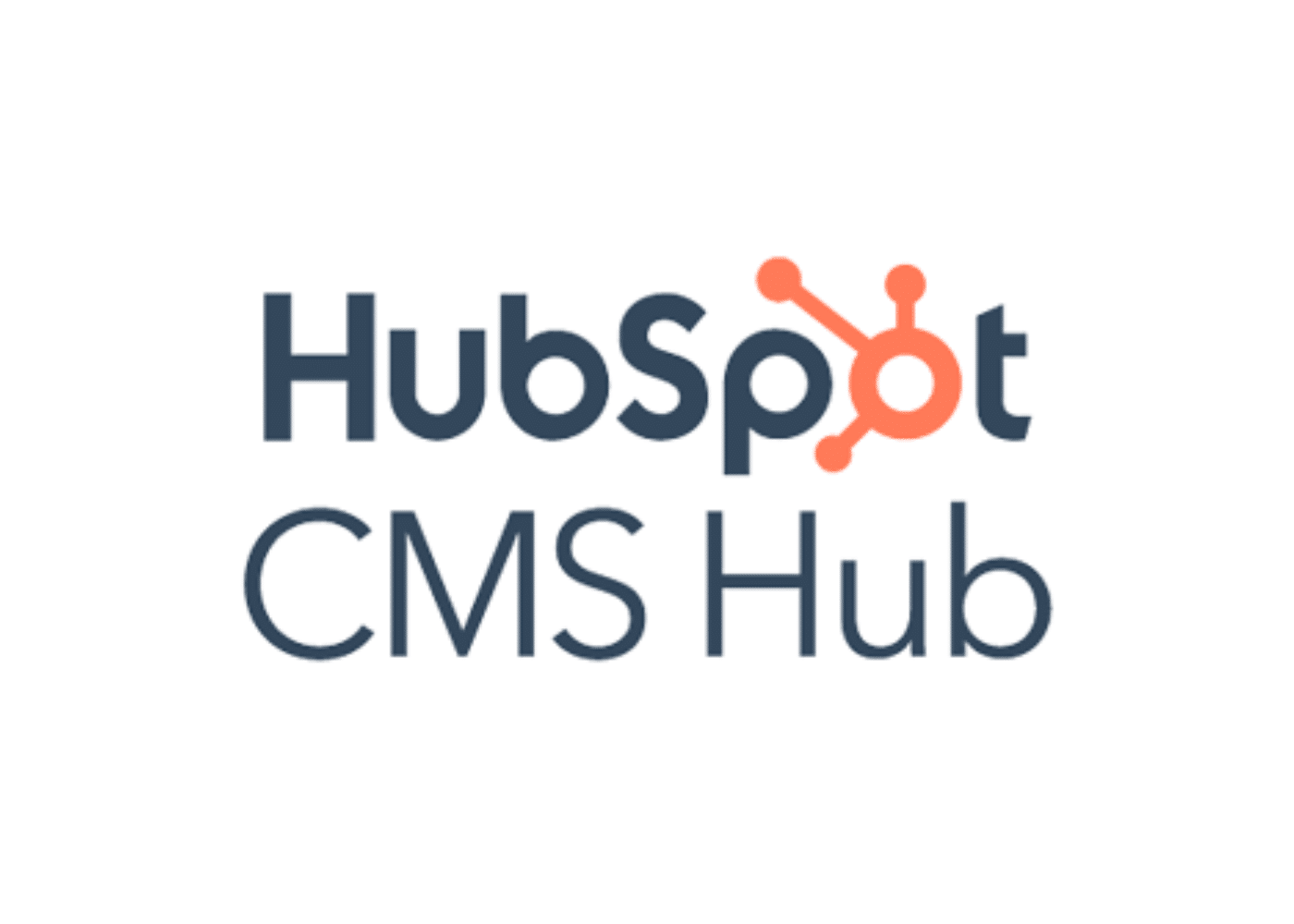HubSpot CMS Hub
Learn More Today!-
Wide Range of Free Tools
-
Customizable Website Themes
-
Custom Domain and Security Features
Content management is essential for businesses nowadays.
Not having the right CMS in place can mean losing customers and sales, or getting bogged down in technical issues.
My name is AJ. I built up a digital agency in just 4 years and sold it for a multi-million dollar exit, so I’ve got some experience when it comes to digital marketing.
The Small Business Bonfire team and I checked out HubSpot’s CMS Hub in-depth to bring you this review.
We utilize HubSpot in a lot of aspects of our business, but here’s a thorough breakdown of their CMS hub.
If you’re ready to nerd out, let’s get into it!
You Can Trust Small Business Bonfire
Since 2009 Small Business Bonfire has been testing and rating thousands of business software to help you (our small business owners) start & scale your organizations. If you want to know more about how we test, please read this article here.
What is HubSpot CMS Hub?
HubSpot CMS Hub is a content management system (CMS) that allows businesses to create and manage their website content.
It’s an all-in-one solution for creating, publishing, hosting, and managing literally everything to do with a website.
Essentially, HubSpot CMS Hub allows you to create, edit and manage the following:
- Web pages
- Blog posts
- Email campaigns
- Landing pages
It’s designed to help busy marketers quickly get content out the door without sacrificing quality or accuracy.
CMS Hub offers free tools, which we always consider a plus. By utilizing these tools, you’re able to create a personalized website for free.
At the agency, we use HubSpot’s services for most clients. For this test, however, we set up HubSpot CMS Hub for Small Business Bonfire specifically. We then tested it thoroughly over several months.
Pros and Cons of HubSpot CMS Hub
HubSpot CMS Hub is a great tool to help manage content, create pages, and provide resources to help content managers.
However, there are some downsides as well. Let’s get into the pros and cons of CMS Hub.
HubSpot CMS Hub Pros
- Intuitive interface with easy drag-and-drop functionality for media
- Free tools that are helpful for smaller businesses with limited budgets
- Multiple users can collaborate on projects easily and securely
- Mobile-friendly design that looks great on any device
HubSpot CMS Hub Cons
- Lack of flexibility when it comes to customizing page templates
- High price tag can be a barrier to entry for smaller organizations
Who Is HubSpot CMS Hub Best Suited For?
HubSpot CMS is best suited for businesses and digital agencies looking for an all-in-one solution for creating and managing their website content.
It is specifically marketing-focused, with features like A/B testing and powerful email marketing, so it is great for companies that are looking to execute marketing campaigns on their websites.
It’s also great for businesses looking to scale up, as it has plans from Starter (for beginners) all the way up to Enterprise.
Who Is HubSpot CMS Hub Not Suited For?
Since HubSpot CMS Hub is more geared towards marketing tools, companies that focus more on the technical aspects of their websites may find it a bit limiting.
In addition, if you need more customization options, the templates available on HubSpot CMS Hub may not be enough.
HubSpot CMS Hub Pricing: How Much Does It Cost?
HubSpot CMS Hub offers the following 3 plans for businesses of all different sizes:
- Starter: $25/Month
- Professional: $400/Month
- Enterprise: $1,200/Month
Although their higher-level plans are on the pricier side, they are certainly worth it if you have the budget.
We found that the Professional plan offered all we needed for our website needs. However, HubSpot isn’t limited to the CMS Hub, checkout our full HubSpot pricing guide before making a decision.
How Does HubSpot CMS Hub Pricing Compare?
Let’s see how CMS Hub stacks up against some of the most popular content management solutions on the market.
HubSpot CMS Hub – $25/Month
- Free plan
- Basic web page customization
- Gorgeous templates
- Advanced SEO solutions
- No additional paid add-ons
WordPress – $9/Month
- Free plan
- Limited web page customization for basic plans
- Templates only available with advanced plans
- No SEO solutions with basic plans
- Additional paid add-ons
Wix – $16/Month
- No free plan
- Basic web page customization
- Templates limited to advanced plans
- SEO solutions limited to advanced plans
- No additional paid add-ons
Squarespace – $23/Month
- No free plan
- Basic web page customization
- Helpful templates
- No SEO solutions with basic plans
- Additional paid add-ons (Squarespace Extensions)
Let’s face it, HubSpot CMS Hub’s plans are on the expensive side at up to $1,200/month.
However, for all the content management features you gain access to, it is well worth the price.
When compared to similar solutions like WordPress or Squarespace, HubSpot CMS Hub offers excellent value.
In addition, since it’s an all-in-one solution, you don’t need to pay for add-ons. Ultimately, depending on the needs of your business, you could end up spending more money overall with WordPress or Squarespace.
HubSpot CMS Hub Pricing Tips
HubSpot CMS Hub Core Features
HubSpot CMS Hub offers A/B testing with their Professional and Enterprise plans.
If you have a marketing campaign planned, this feature can help you understand customer behavior and optimize your pages for better conversions.
We got started by creating two versions of a sample email offer we created. It was surprisingly easy to navigate everything, and we were testing within minutes.
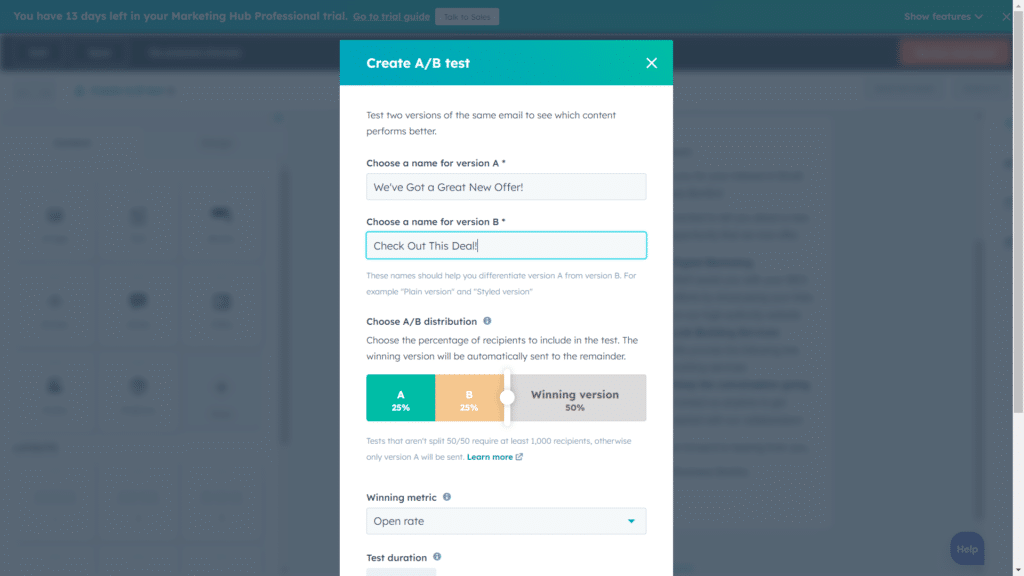
You can also A/B test different versions of your web pages to get a sense of what your customers prefer.
HubSpot CMS Hub is fully optimized for mobile devices, which makes it easy to manage your website on the go. Plus, the mobile-friendly design looks great no matter what device you're using.
Here's an example of the mobile view of the theme we went with during our testing.
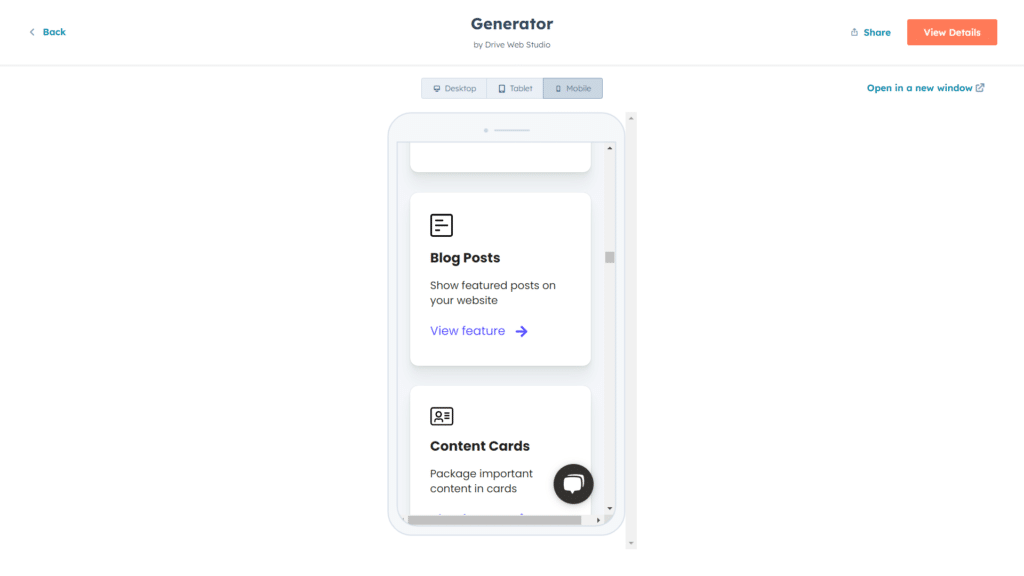
HubSpot's CMS Hub allows you to manage all of your social media accounts in one place.
You can easily post updates, monitor comments, and view analytics within HubSpot.
They also provide articles to help with social media that we found particularly informative.
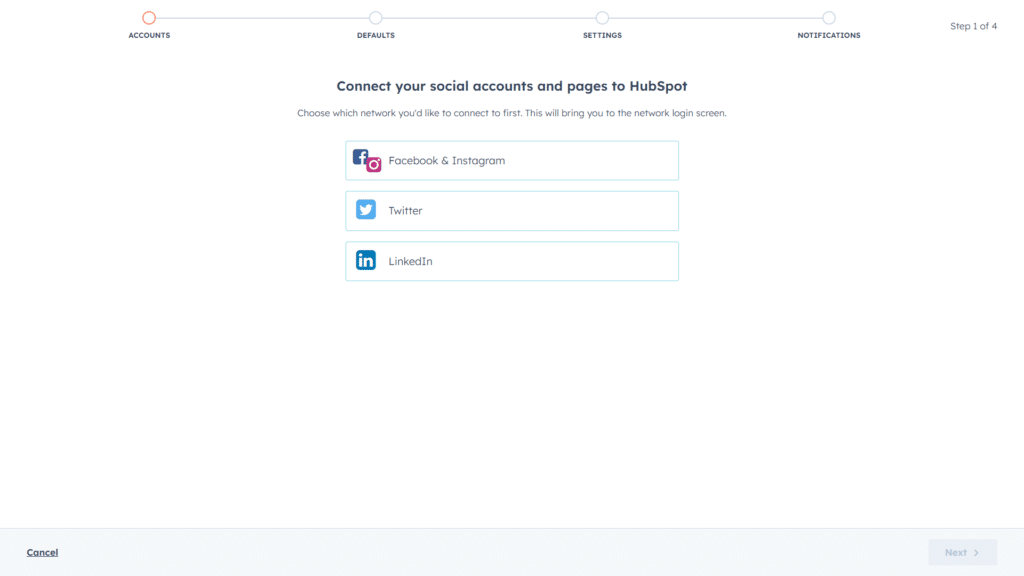
You can also create a schedule for posting so you don't lose engagement with followers. Here's an example of how easy to set up and use it is.
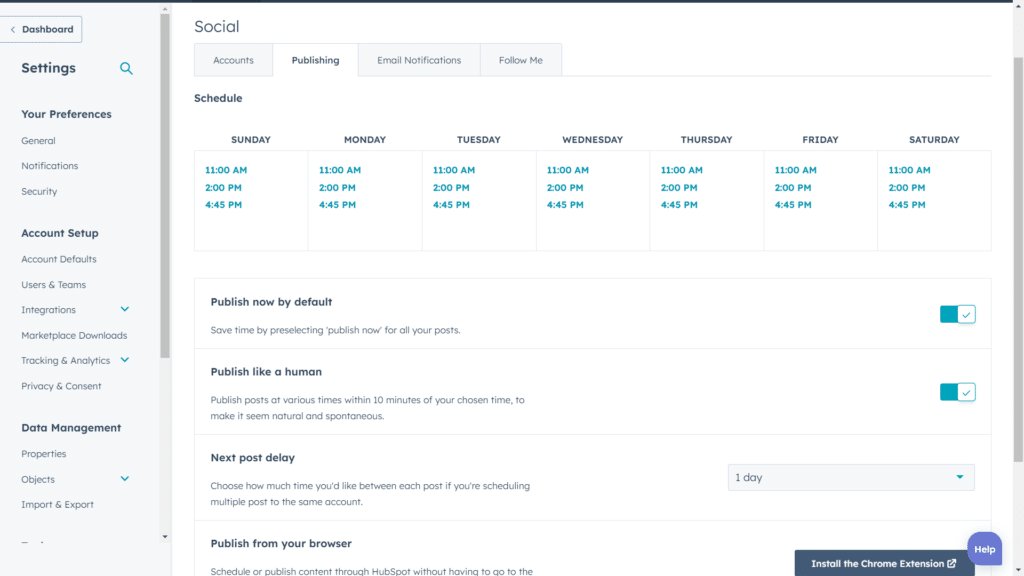
HubSpot CMS Hub offers a wide variety of flexible themes for your website.
We especially liked the fact that you can search through these themes using the following metrics:
- Business types
- Page types
- Page features
- Price
- Rating
- Providers
- Tags
This allowed us to quickly find what we needed by sorting through their catalog of themes.
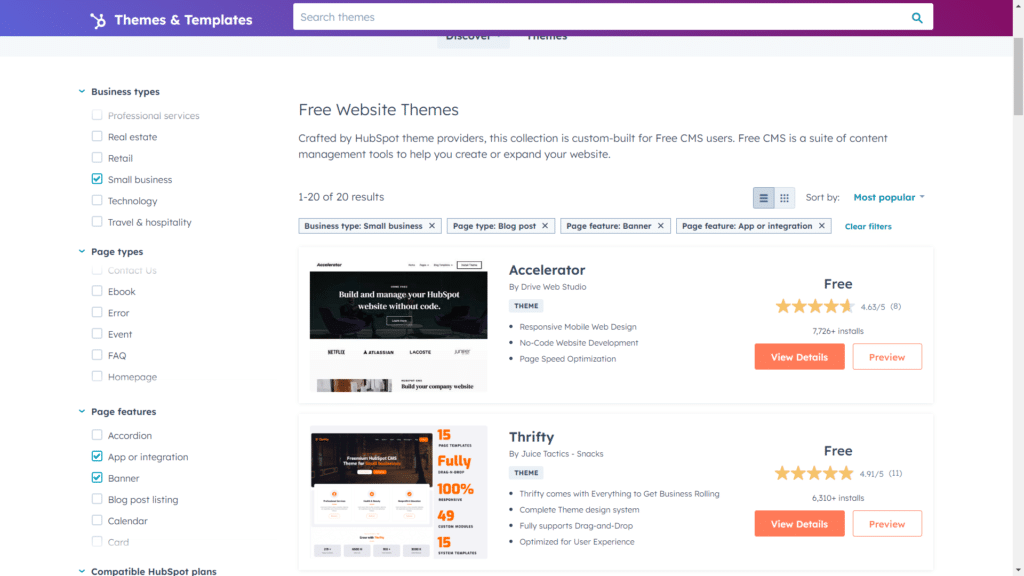
You can also preview what each theme will look like on desktop, tablet, and mobile.
This is important as you can get an idea of what visitors to your site will see. You can then edit your website based on where you want to specifically direct your web traffic.
You can easily connect a custom domain with your HubSpot CMS Hub website.
We connected our site, smallbusinessbonfire.com to HubSpot, and it only took a few minutes.
Here's what the setup process looks like.

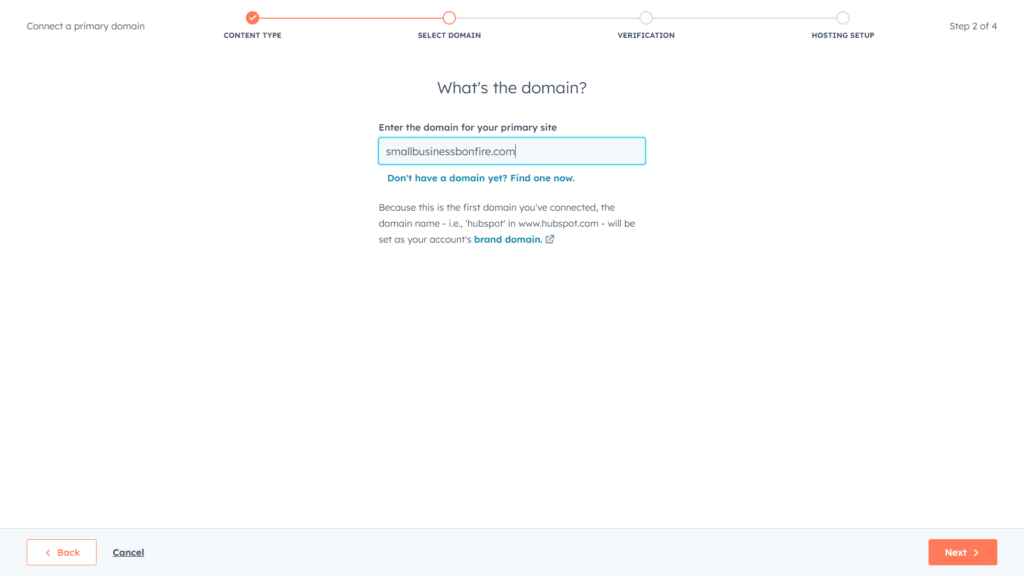
Creating a landing page is as easy as doing the following:
- Selecting a template
- Adding your customizations
- Hitting publish
You can even schedule your page to be published on a specific date (pictured below).
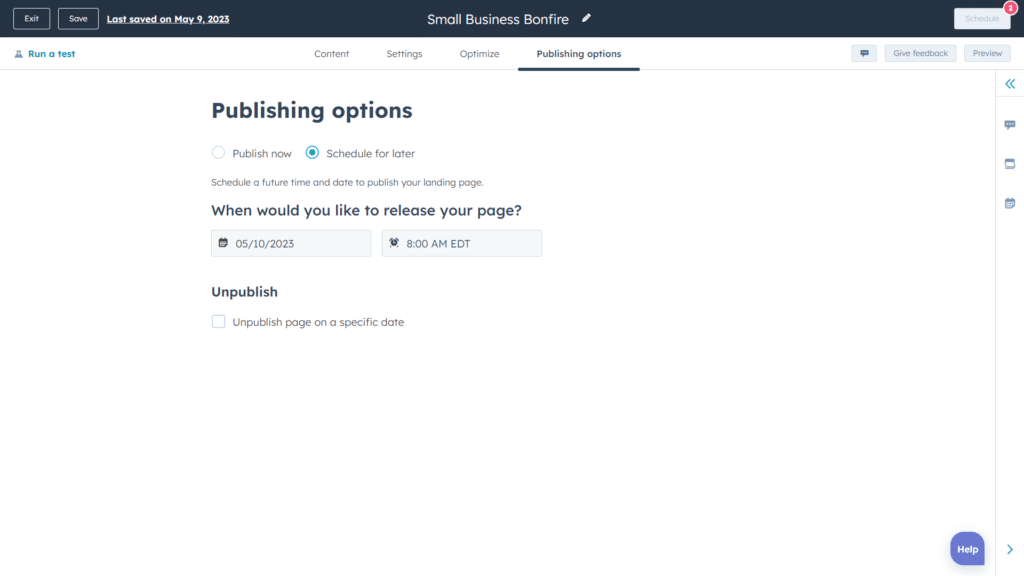
Here's an example of a basic landing page that we set up in just a couple of minutes. It was quick and easy, with only a few user interface issues on our team's end.
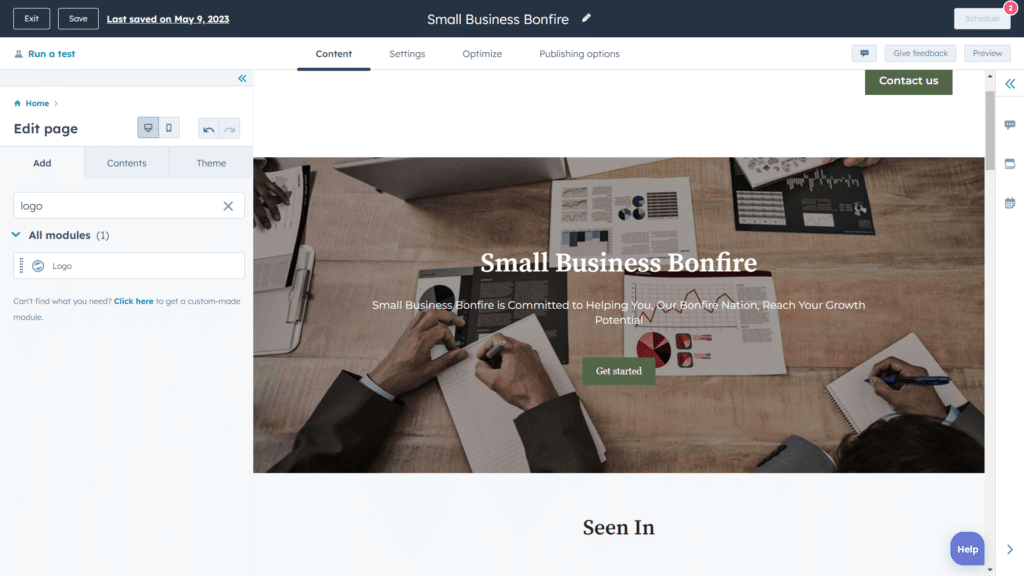
HubSpot CMS Hub's Blog Expert feature makes it easy to create and manage a blog that is highly optimized for Google ranking and SEO.
You can also choose to import your blog using the following methods:
- Smart copy
- WordPress connect
- CSV file upload
- XML file upload
Ultimately, we chose to import our blog. Here's an example to give you an idea of the simple-to-navigate user interface.
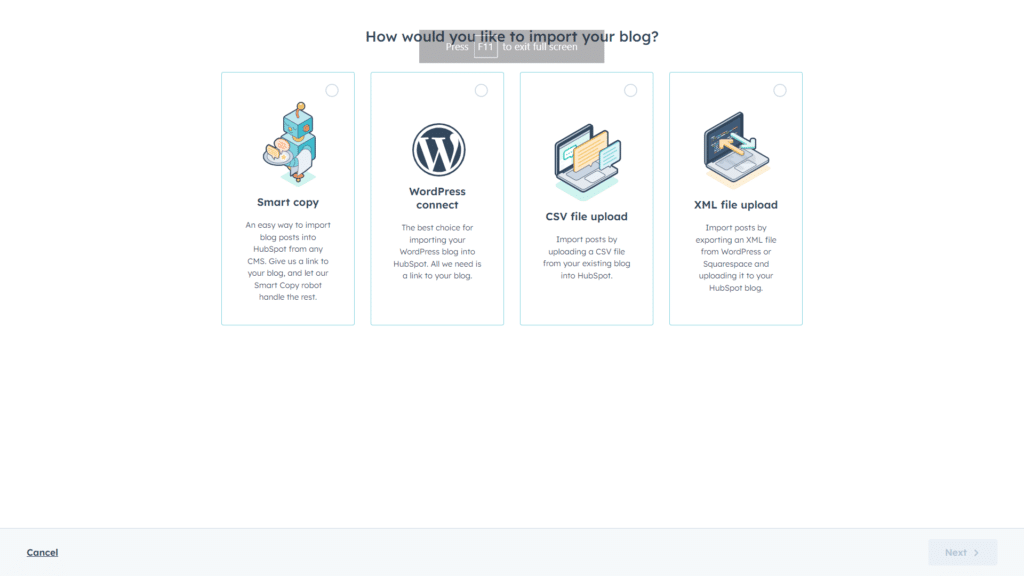
You can easily create, send out, and track effective email marketing campaigns with HubSpot CMS Hub.
We designed an email with a customizable template that was very easy to use.
You can also add the following to your emails:
- Images
- Video content
- Social media links
- Products
Here's an example of how we customized the background, added our logo, and created some text.
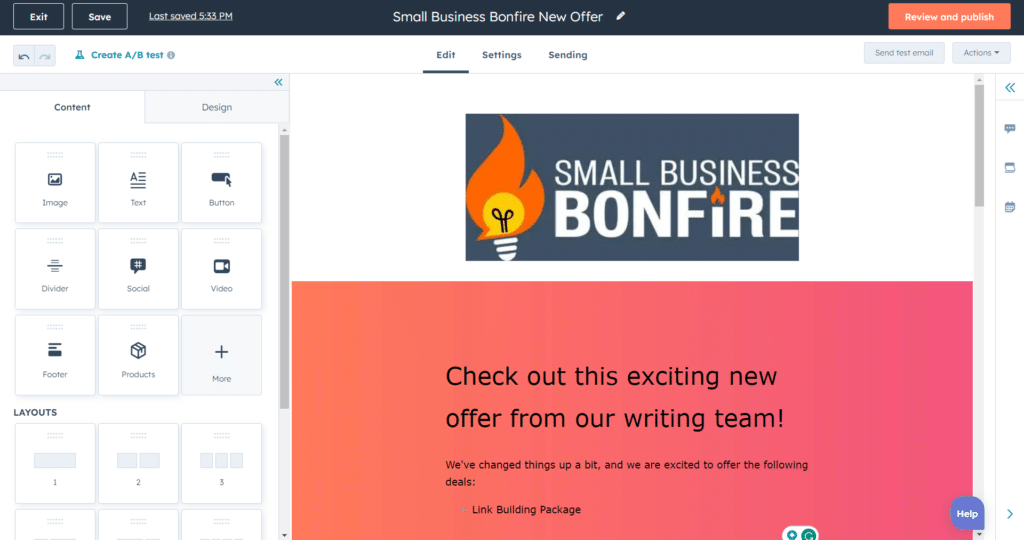
We found that this template would be especially useful for less experienced marketing teams looking to make a name for themselves.
On CMS Hub, every website you create comes with a built-in SSL.
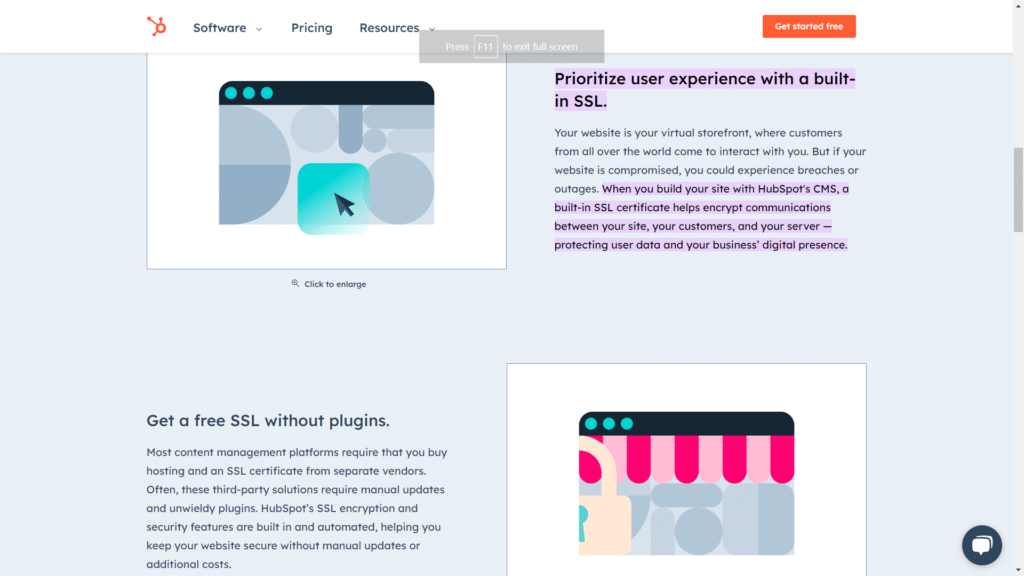
This helps make sure that you provide a secure experience for both your business and potential clients.
You can easily track how your website is performing with HubSpot CMS Hub's analytics dashboard.
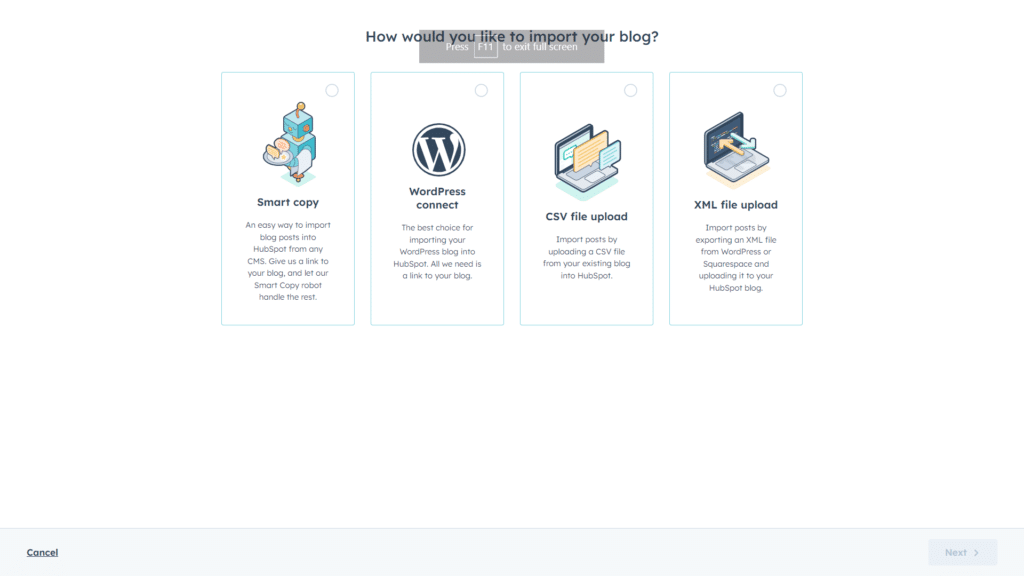
This allowed us to monitor traffic, engagement, and conversions so we could make the necessary changes as we tested the service.
Being able to track this in real-time allows you to ensure you are paying attention to metrics such as:
- Website visitors
- Customer satisfaction
- How customers prefer to engage
What are the Limitations of HubSpot CMS Hub?
The biggest limitation of HubSpot CMS Hub is the price tag. While they do offer free tools and a Starter plan, if you’re looking for more content management, it’s going to cost you.
If you have a company that needs a lot of customization but doesn’t have a substantial budget, you might want to look at an option such as WordPress where you only pay for the additions you need.
Is HubSpot CMS Good for SEO?
HubSpot CMS Hub is great for SEO. They offer SEO recommendations and optimizations for your website based on a preliminary scan of your site.
Here’s an example of what that looks like. It can take anywhere from three to six hours for the scan.
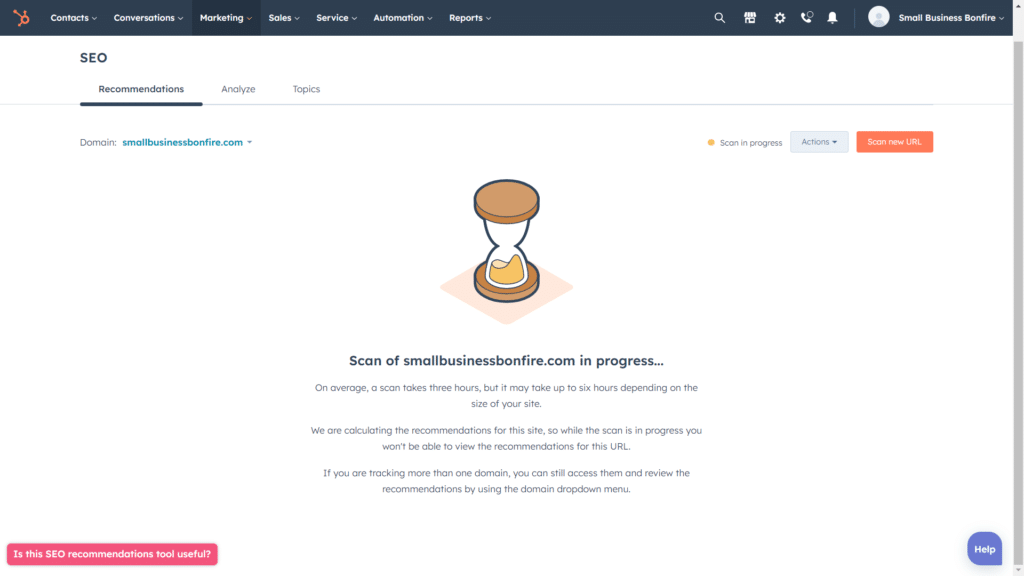
What’s the Difference Between Hubspot Marketing Hub and CMS?
Both HubSpot Marketing Hub and CMS Hub are geared toward marketing.
The main difference is that CMS Hub deals with creating and managing web pages using:
- Templates
- Drag-and-drop features
- SEO optimization
Its main function is to streamline your content management by having everything in one place.
Whereas Marketing Hub focuses more on the following:
- Analytics
- Lead capture
- Email marketing
Marketing Hub is more about attracting, converting, and retaining customers.
What Sets HubSpot CMS Hub Apart from the Competition?
In our opinion, what really sets HubSpot CMS apart from the competition is how streamlined and easy to use it is.
We signed up and were customizing our website using within minutes with their helpful User Guide system. The guide walks you through everything from customizing your theme (shown below) to connecting your own domain to HubSpot.

Ultimately, if you can afford the rather steep price, HubSpot CMS Hub stands out amongst the competition.
Getting Started with HubSpot CMS Hub
As we mentioned above, getting started with CMS Hub was a breeze.
The setup process consisted of filling out a few forms with the following info:
- Industry
- Job title
- Organization
The Small Business Bonfire team is already very familiar with HubSpot and its onboarding process, but we feel like it would be perfect for beginners as well.
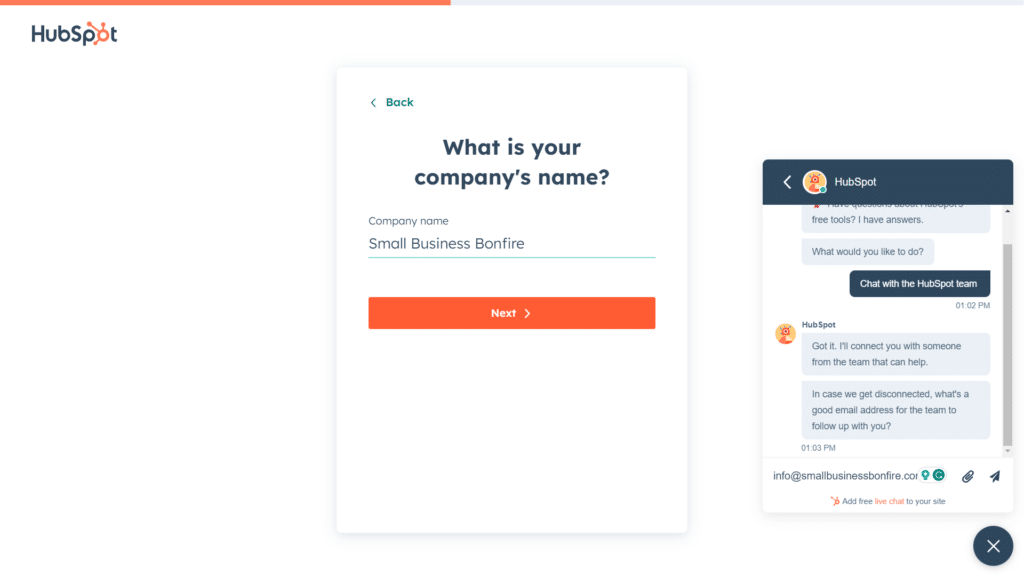
How Do You Use HubSpot CMS Hub?
HubSpot CMS Hub is best used for creating and managing content all in one place, including:
- Websites
- Landing pages
- Blogs
- Online store
CMS Hub is an ideal choice for marketing-oriented businesses looking to create a website that is optimized for lead generation and customer engagement.
HubSpot CMS Hub Customer Service & Support Review
We contacted CMS Hub support for an issue we had adding a team member. Our goal was to speak to someone live via phone or chat, but both were unavailable.
We sent off an email and are currently waiting to hear back from someone.
Personally, I think that the customer service could have been more responsive in this case.
It is worth noting that HubSpot provides a very helpful resource with their HubSpot Academy. Any questions we’ve had while testing their software have generally been answered by watching many of their helpful tutorial videos.
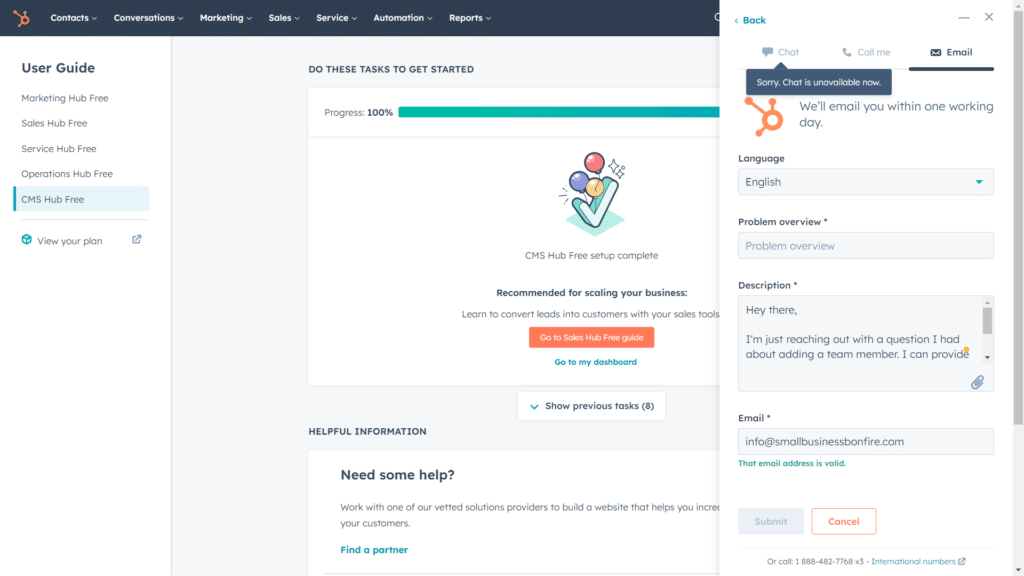
Other HubSpot Hubs
In addition to HubSpot CMS Hub, the software also has Hubs to help optimize your business and keep everything in one spot.
The SBB team and I especially appreciated the ability to have all of our customer data in one place utilizing these different Hubs.
These include the following:
- HubSpot Marketing Hub
- HubSpot Sales Hub
- HubSpot Service Hub
- HubSpot Operations Hub
Let’s go over each to give you a better idea of what kind of features they provide.
HubSpot Sales Hub
HubSpot Sales Hub is a CRM software that allows you to track and manage your deals with your team in real-time.
The CRM platform also includes features such as the following:
- Deals manager
- Forecast capabilities
- Tasks function
- Payment tracker
Here’s an example of some mockup deals to give you an idea of the layout.
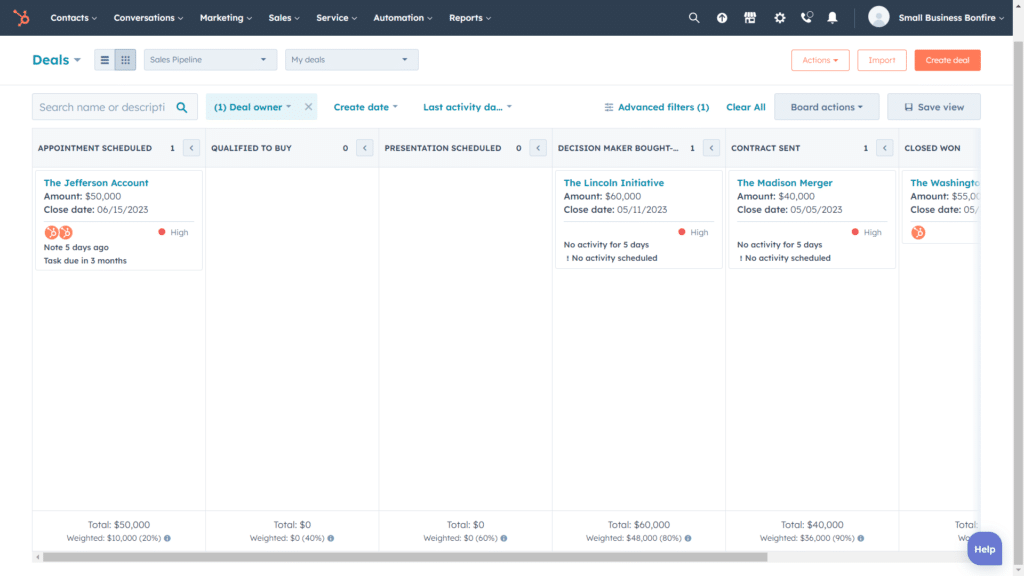
We created and named the deals with ease by utilizing HubSpot’s impressive CRM software. We were then able to assign close dates, priority levels, and the amount for the deal.
Our HubSpot Sales Hub review provides a lot more information about what the service is capable of.
HubSpot Service Hub
HubSpot Service Hub is your all-in-one customer service software.
They have a streamlined customer ticketing process that’s available for free, plus customer portals, and a feedback survey feature to get a better sense of user journeys and customer preferences.
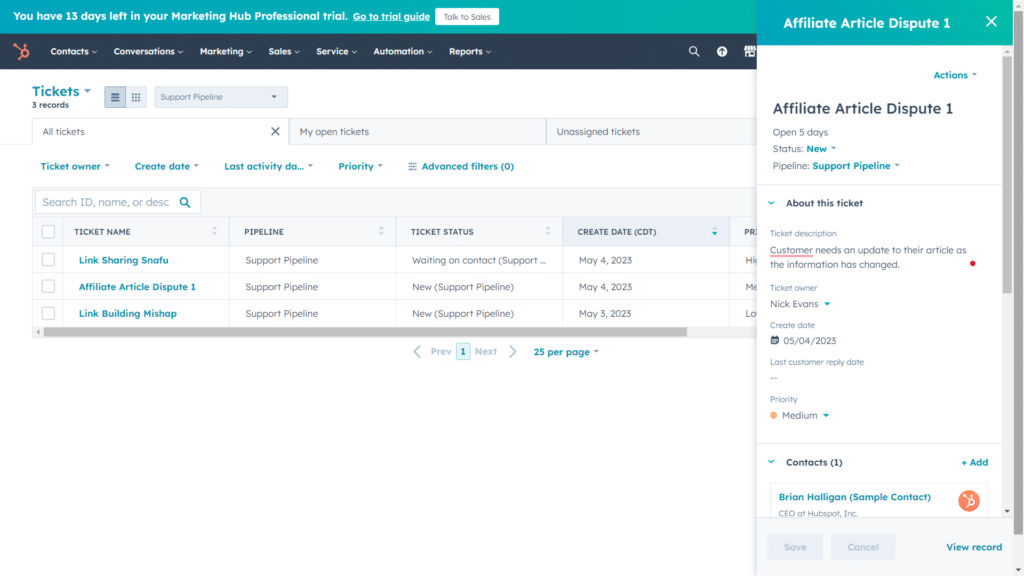
Check out our HubSpot Service Hub review for a more in-depth look at the platform.
HubSpot Marketing Hub
We’ve discussed how HubSpot Marketing Hub is different than their CMS Hub.
Now let’s look at an overview of the product.
Marketing Hub provides all of the tools that a business needs to manage its marketing campaigns.
Some of the features include:
- Ad management
- Social media integration
- Email marketing tools
- Lead capture
Here’s a screenshot of the ad management integration feature.
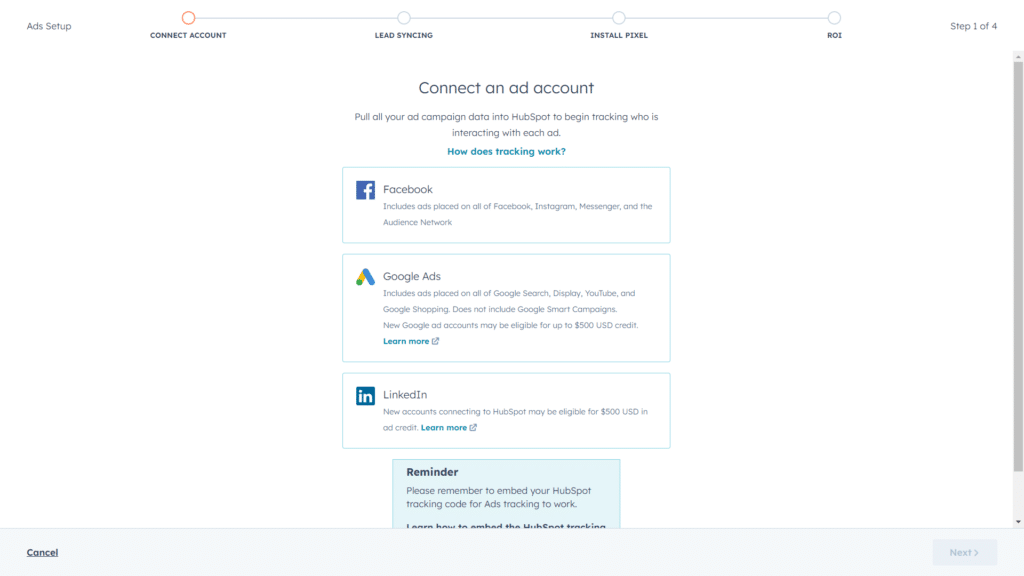
HubSpot Operations Hub
Operations Hub is great for simplifying your business operations making sure everything runs as efficiently as possible.
Put simply, the service helps manage your data between multiple systems and makes sure everything is all in one place. It’s especially helpful for larger organizations that have a ton of data to manage between multiple sites.
Operations Hub includes some popular features such as:
- Data Bridge (to connect multiple systems)
- Integrations with other software
- Analytics & reporting tools
HubSpot CMS Hub Alternative Comparison
HubSpot CMS Hub is a great way for marketers to manage content all in one place. However, it’s not the only content management software out there.
Here are a few services that provide other features and resources that might fit your specific needs.
Is HubSpot CMS Hub Worth it for Small Business Owners?
We’re very impressed with CMS Hub, and we absolutely recommend it if you plan on creating a marketing-oriented website.
During our testing, we found that it was easy to use, incredibly well-designed, and can help save time and money when building an online presence.
Whether you’re a beginner looking to get started or a pro that’s looking to scale your business, we think HubSpot CMS Hub could be a great fit.
Frequently Asked Questions About HubSpot CMS Hub
HubSpot CMS is an excellent platform for businesses of all sizes. It offers a wide range of features and tools that make it easy to create and manage websites quickly. Additionally, the platform offers great SEO optimization and analytics so you can track your website’s performance over time.
HubSpot CMS is better than other platforms because it offers great features such as built-in website themes, the ability to easily connect a custom domain, web pages, blog expert, and email marketing. Additionally, the software is secured with standard SSL encryption and provides comprehensive analytics so you can track your website’s performance over time.
Yes, HubSpot CMS is great for SEO. The platform offers built-in tools to help you optimize your site and content for search engine success. Additionally, the platform makes use of advanced analytics to track and monitor your progress over time.
HubSpot CMS is different from WordPress because it offers a wide range of features and tools such as built-in website themes, easily connect a custom domain, web pages, blog expert, and email marketing. Additionally, the software is secured with standard SSL encryption and provides comprehensive analytics so you can track your website’s performance over time. In comparison, WordPress requires more manual setup and maintenance, plus there are fewer options for customization.
Many companies use HubSpot CMS software, including The New York Times, Netflix, PepsiCo, Dell Technologies, and many more.
HubSpot is a fantastic CRM platform depending on your specific needs and budget. At Small Business Bonfire, we utilize HubSpot to capture leads, track customer tickets, and for their website builder.
Newsletter Signup
Join The Leads Field Guide Newsletter for tips, strategies and (free) resources for growing your leads, and closing more deals.

